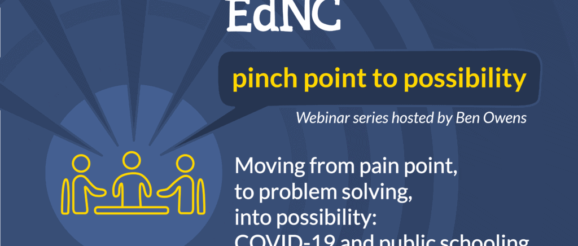Virtual event series on education innovation in North Carolina

Ben Owens, co-founder and chief innovation officer at Open Way Learning, is co-hosting a three-month virtual event series with EdNC. This series of webinars attempts to leverage the heightened public focus on our education system as a way to highlight and scale authentic innovation.
The COVID-19 pandemic has had an unprecedented impact on every aspect of life around the globe, including a massive disruption to schools here in North Carolina. Students, parents, teachers, principals, and others have had to quickly adapt to a “new normal” of remote learning. This pandemic has highlighted education’s critical role in the fabric of our democracy, with countless examples of educators going above and beyond to respond in heroic ways to ensure their students are safe, fed, and have access to essential social programs.
At the same time, the crisis has further highlighted a number of glaring inequities in our educational systems that have remained unaddressed for far too long. Questions that have arisen during the COVID-19 crisis lead many to wonder about issues such as reliable internet access for every child, the alarming number of disengaged students, criticism over uninspiring assignments and work packets, and the questioning of the role of high stakes testing. Yet for each of these pain points, there have been examples from across the state of teachers, administrators, students, schools, and districts that have demonstrated what is possible when we think differently and use creativity and ingenuity to better meet the needs of all students.
This series of webinars attempts to leverage the heightened focus on our education system as a way to highlight and scale authentic innovation. It will identify the pain points, define the problems we face, and then highlight images of possibility that can be adapted and brought to scale in more schools, for more North Carolina students.
Framed by the design thinking process, we will conduct three in-depth conversations with education stakeholders from across the state. We will begin with empathy, by listening to those affected most by our educational systems: students and parents. We will use this feedback to identify common themes and trends in order to clearly define underlying problems. And then we will highlight examples of possibility from teachers, schools, and districts that have used innovative approaches to address these problems in ways that can be adapted and scaled.
At each step in the series, we will go beyond the superficial by asking hard questions to better understand pragmatic details, as well as the cultural conditions needed for more educators across North Carolina to move from pinch points to possibility.
Parents, teachers, and students, please share your voice with us by taking this survey about school during COVID-19.
Session 1
Thursday, June 11 | 4-5 p.m.
Like no education reform effort has been able to do, this crisis has created an unprecedented level of public will for change. The tension between the elements of “doing school” and on meeting the individual learning and growth needs of every student is real.
This session will dig into these pain points with a panel of education stakeholders that are witnessing them firsthand. It will be a discussion that is informed by survey results from parents and students and will use empathy mapping to develop a draft problem statement (or statements) in terms of these voices from across the state.
Session 2
Thursday, July 16 | 4-5 p.m.
Too often, organizations large and small are prone to jump to “solutions” without clearly understanding and defining the problem they face. This is an all-too-common issue in education as well! Like the first session in this series, this one will be made up of education stakeholders from across the state and will use an empathy informed process to refine and clearly define the problem(s) we wish to solve. The panel will then model how divergent thinking and brainstorming can identify potential breakthrough solutions.
Session 3
Thursday, August 13 | 4-5 p.m.
This culminating session will highlight examples from across North Carolina that explicitly address the problem. This session will not only dig into the pragmatic steps educators used to implement these solutions, but will also discuss the cultural elements that enabled these innovations to thrive. In doing so, the conversation will highlight specific steps other educators can take to adapt similar approaches in their own classrooms, schools, and districts, thus helping bring these innovations to more students across all of North Carolina.
